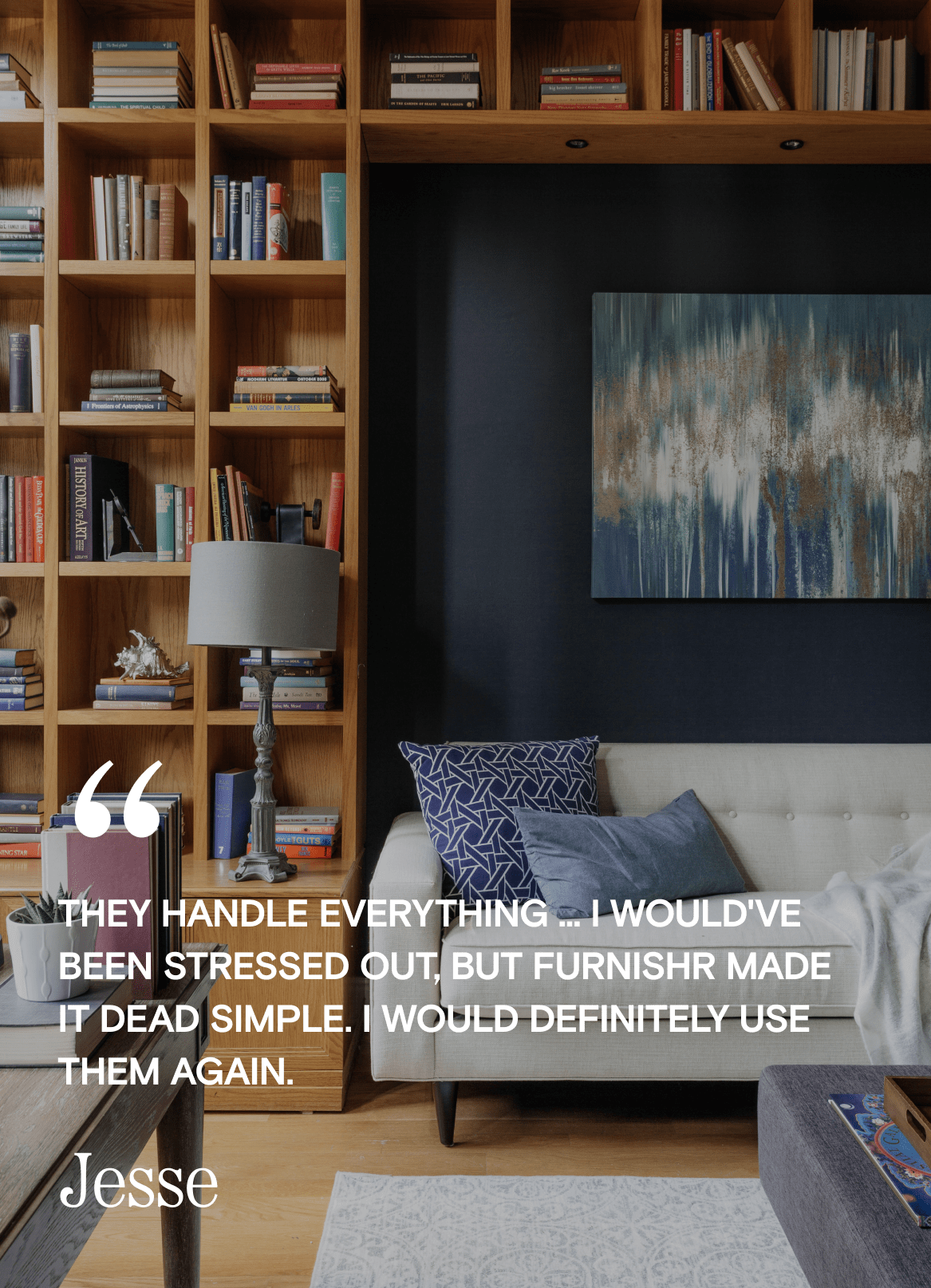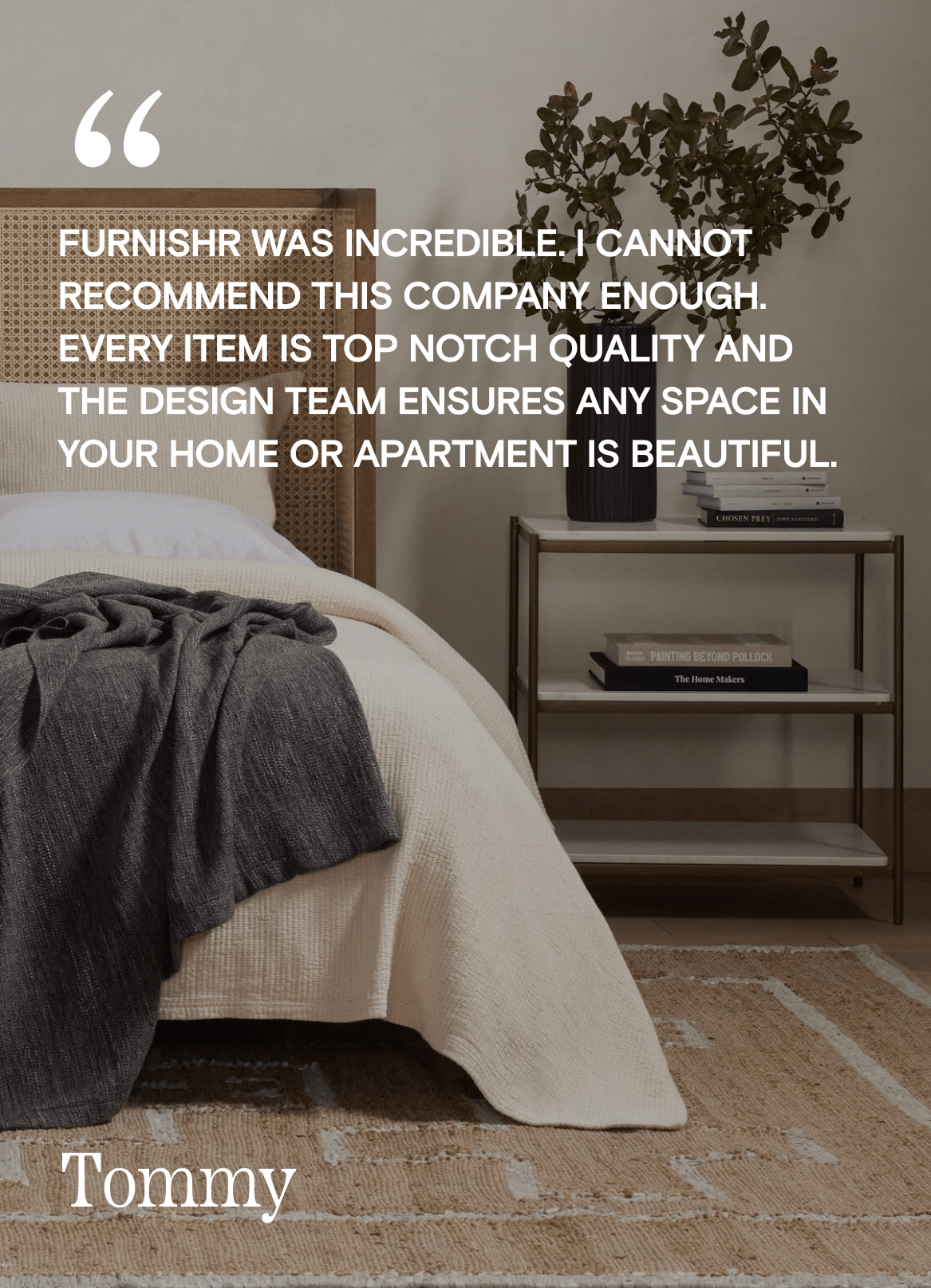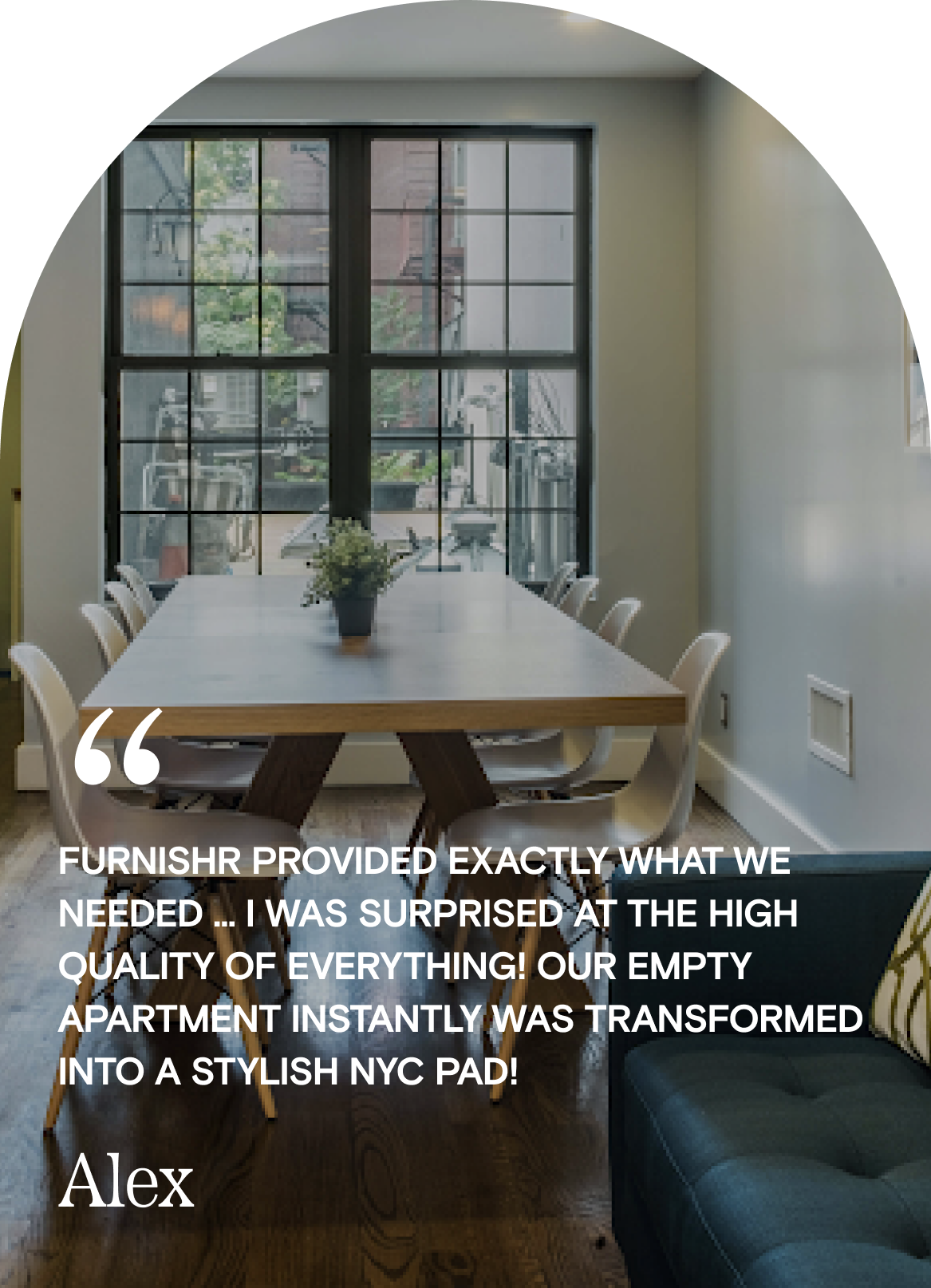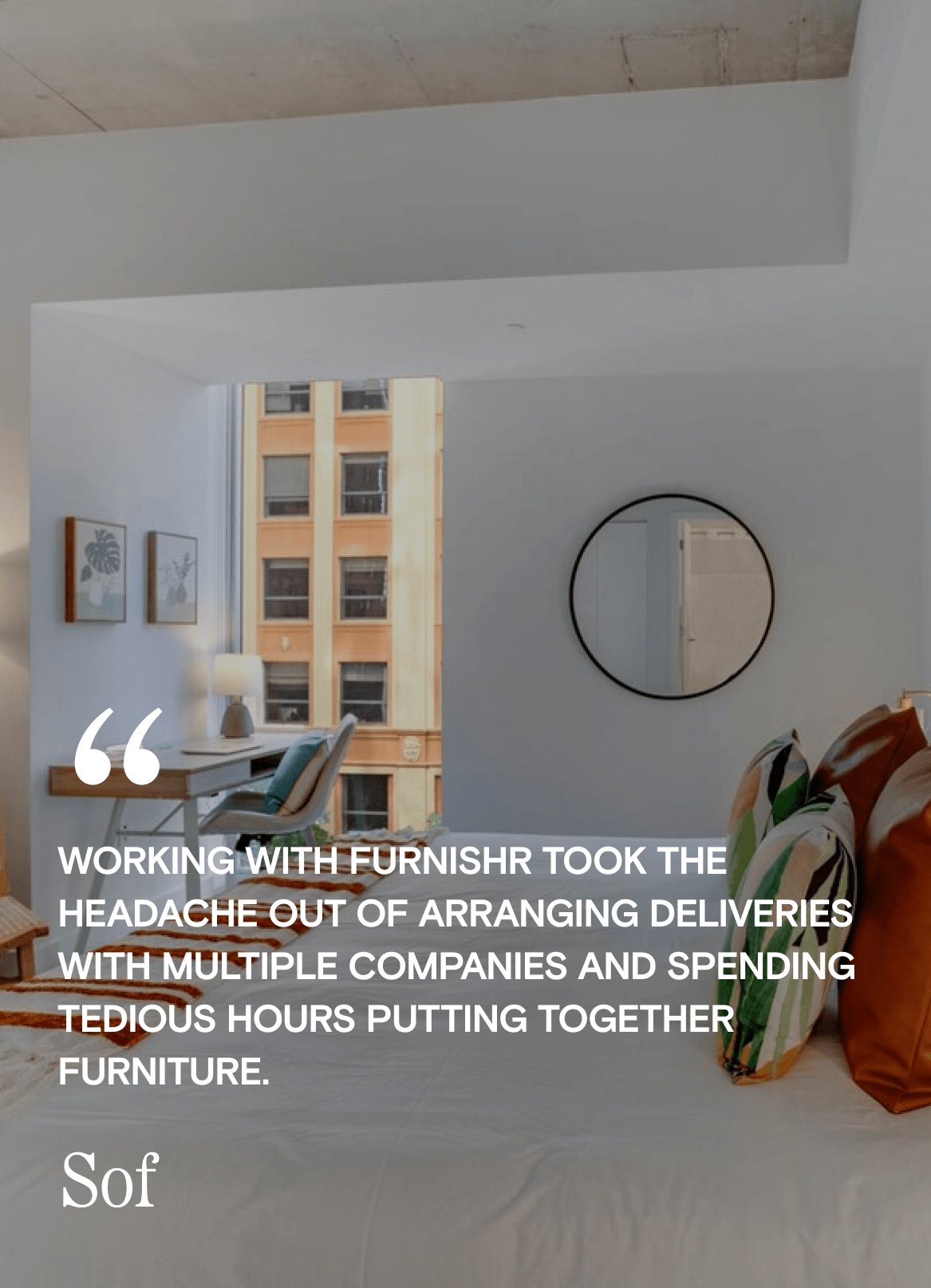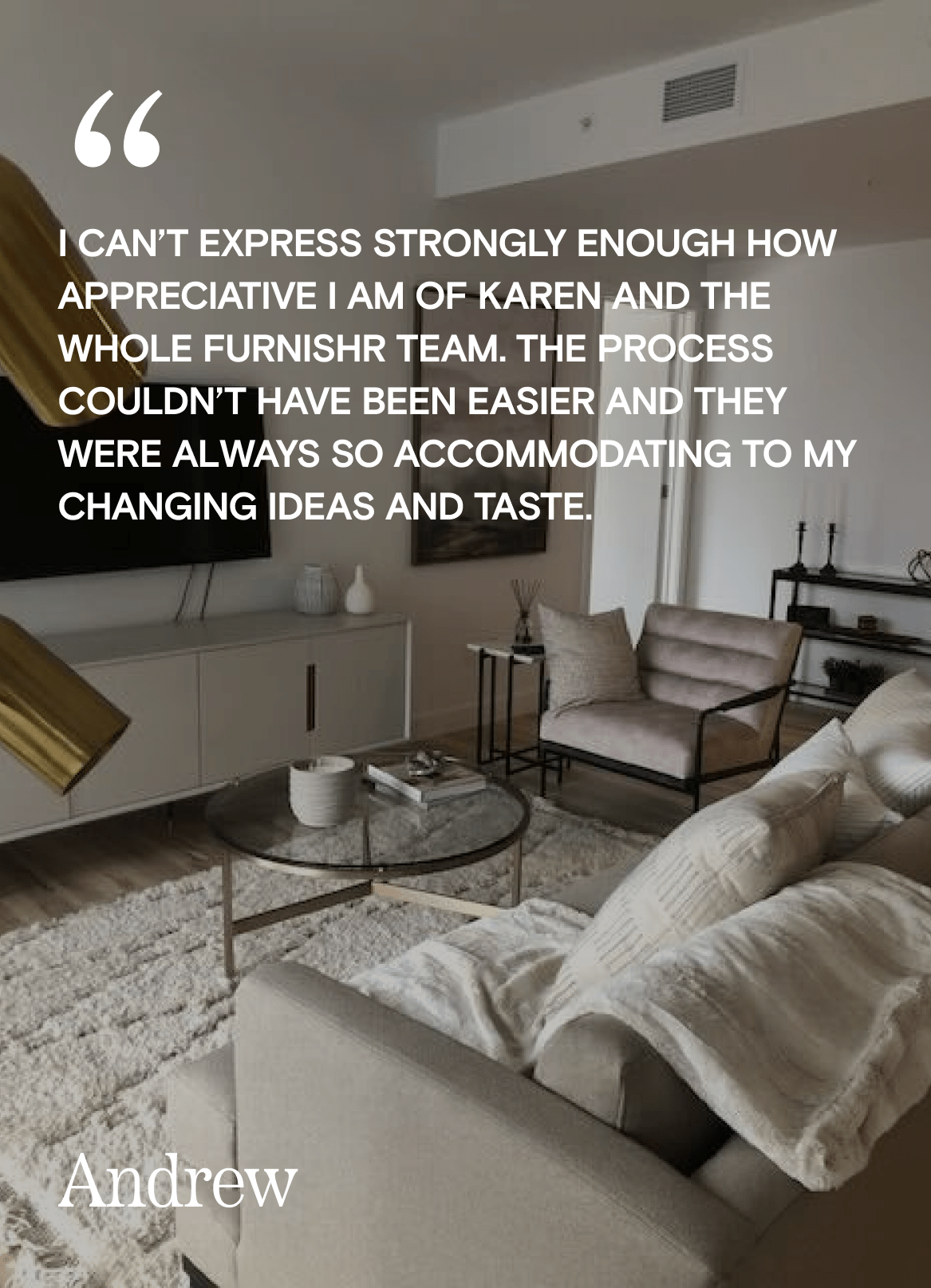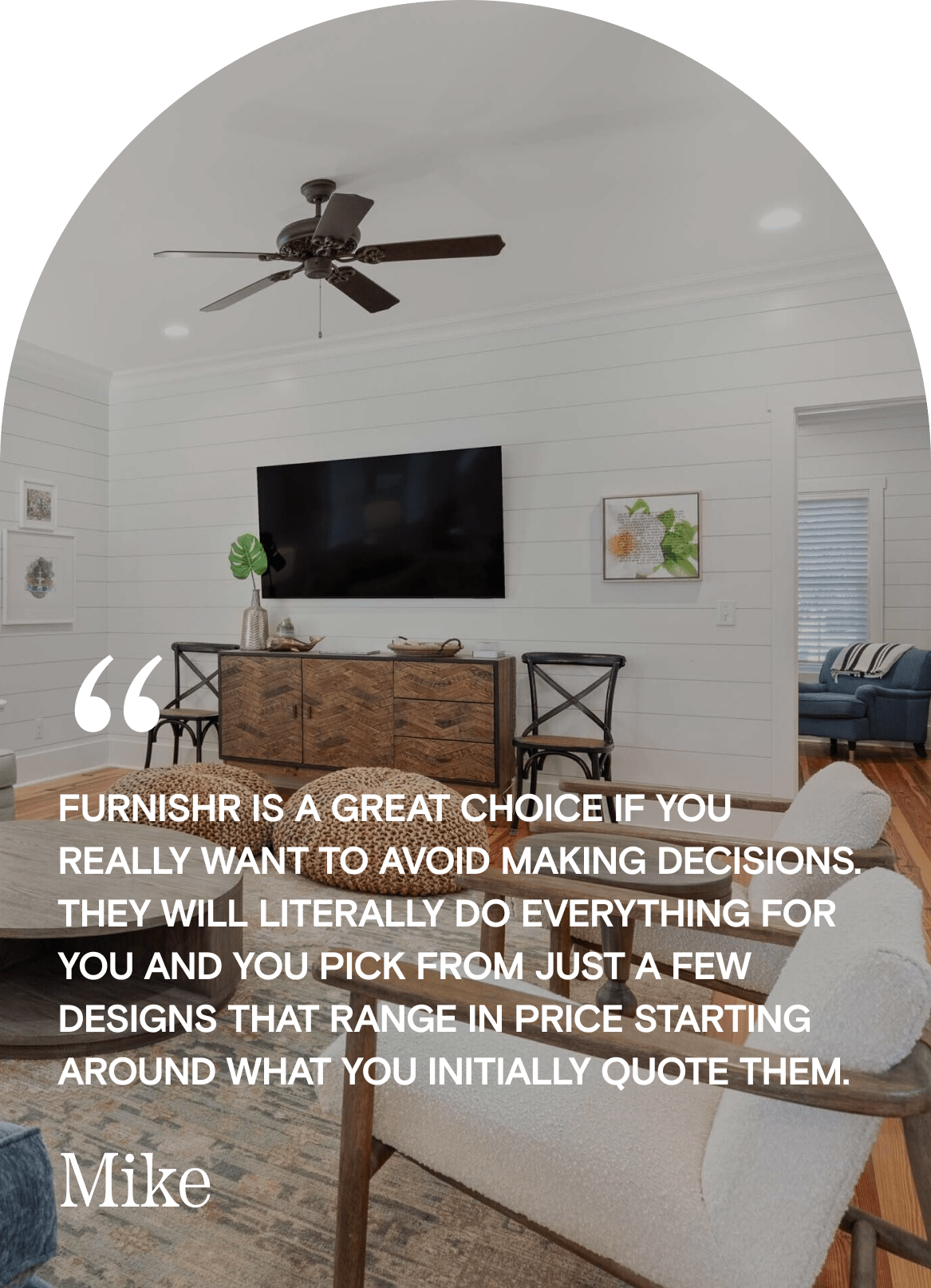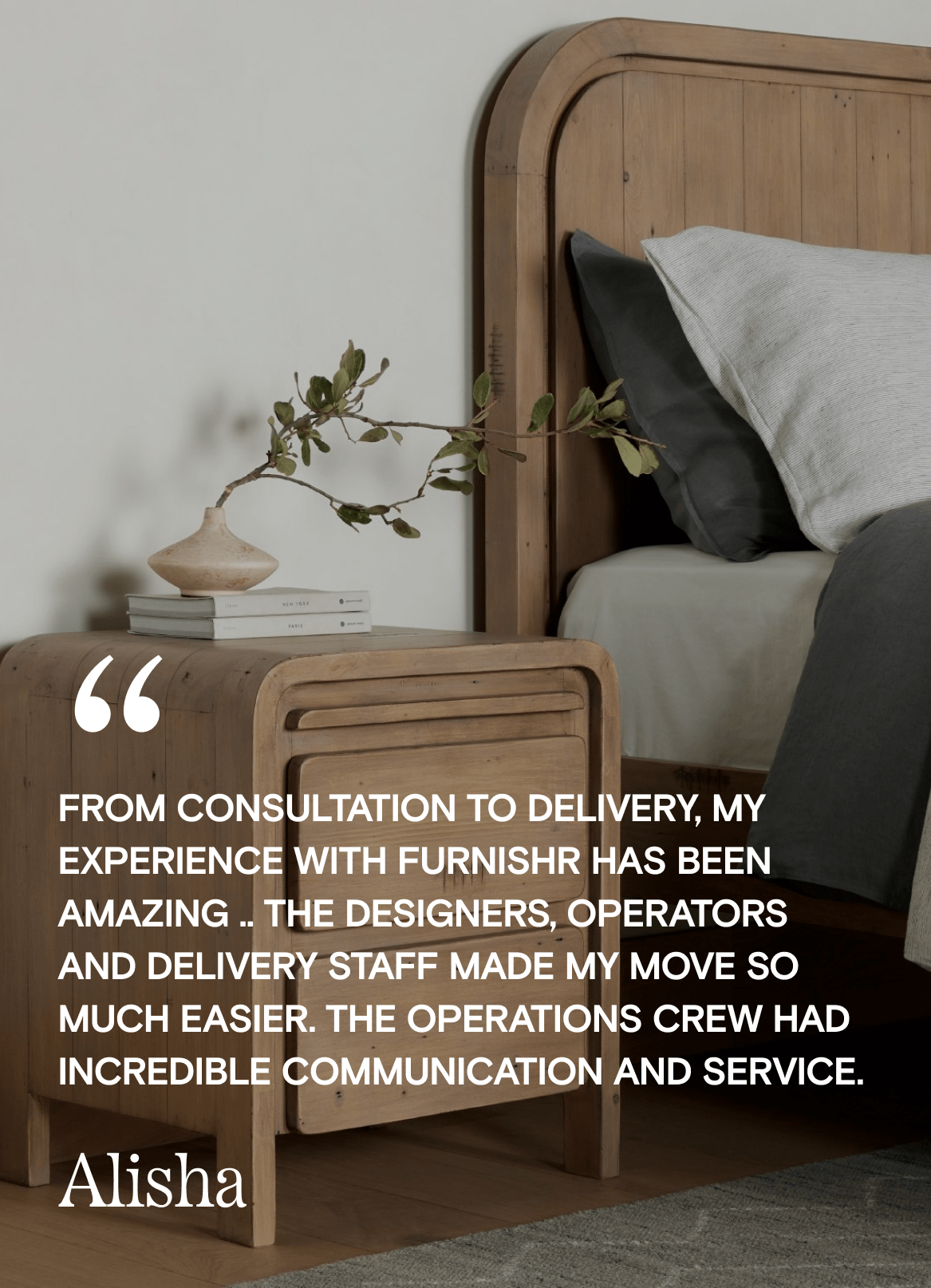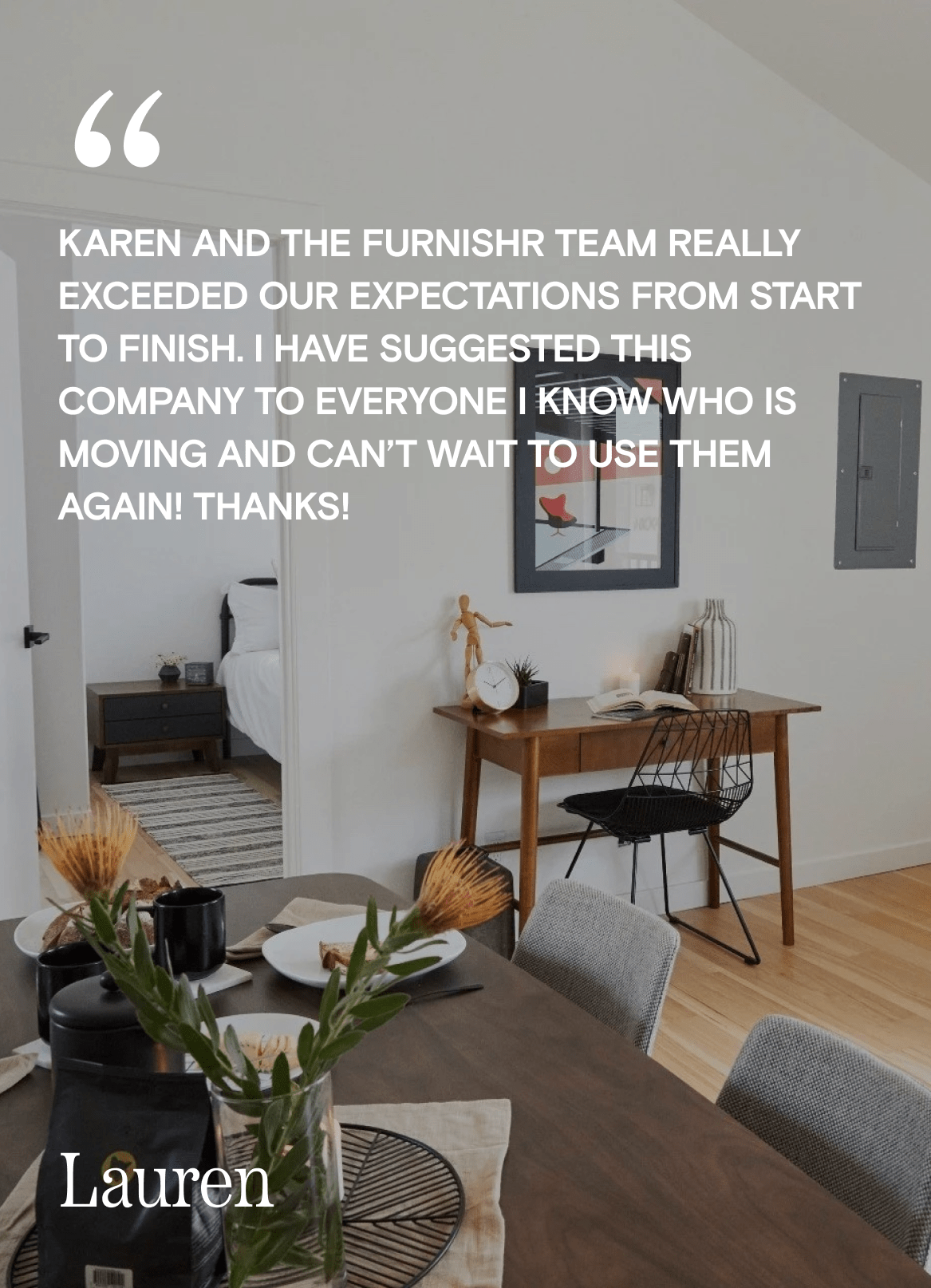Get design expert strategies to attract bookings, impress guests, and keep them coming back.

- Karen Lau
The short-term rental market has never been more competitive. With so many beautiful, well-reviewed properties out there, it’s easy for great vacation rentals to get lost in the scroll. If you’re preparing to list your space on Airbnb or Vrbo, you’re probably wondering how to get noticed and start collecting positive reviews quickly.

My team and I work with short-term rental hosts every day who are facing these exact challenges. They’re worried about the high cost of their property sitting unoccupied. And they’re overwhelmed by the thousand-and-one decisions they need to make: how to design for guests, what to buy, and how to launch quickly without sacrificing quality.
With the right strategy and support, it’s possible for every host to create a thoughtfully designed, fully-furnished space that succeeds from day one.
To help you get there, we’re rounding up our top tips for how to design for short-term rental success. Beyond making your space look good, these strategies are all about creating an experience that guests love, all while launching faster, avoiding costly mistakes, and designing with confidence.
Get to know your guests
Even if your short-term rental doubles as your secondary residence, you can still design a space that caters to all the things your guests need. Here’s where a quick brainstorm can go a long way. Who do you want to attract to your rental and what do they need to feel satisfied with their stay? Consider these three factors:
1
Your property:
What type of guest will love your space? And what size of group can you accommodate? Is your property giving cozy weekend-for-two vibes? Or will it be a destination for multigenerational families looking to create memories (and a little chaos)?
2
Your city or town:
If you’re in a big, urban centre, you’re more likely to host working professionals, possibly with their partners or families. Or you might attract couples and small groups wanting to explore the city. Bigger groups tend to choose more remote listings like cottages or country homes.
3
Your local environment:
Think about what attractions bring people to your area. Are you near a theme park that’s popular with families? A national park or ski hill that draws outdoor adventurers? A vibrant culinary or nightlife district where foodies and friends gather? Understanding the local scene is a great way to get to know your guests — why they’re visiting, what excites them, and how you can give them the best experience.
Focus on communal experiences and quality sleep
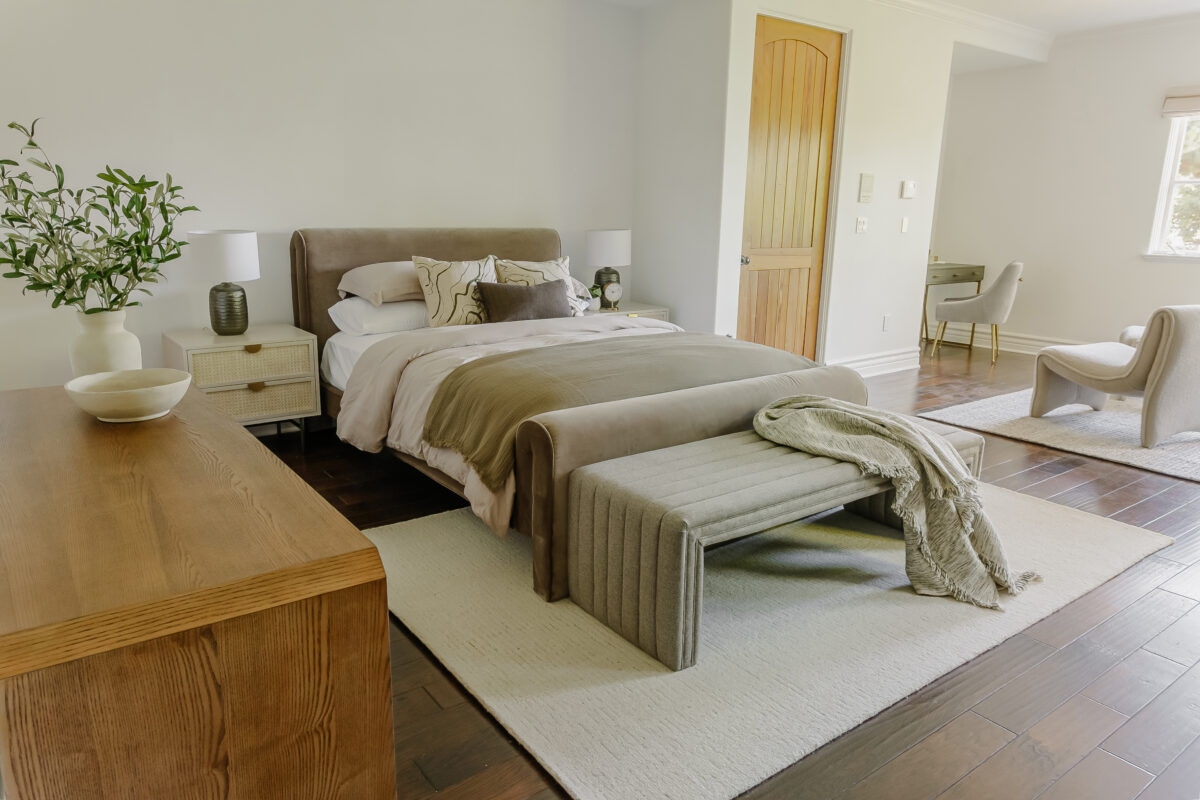
Whether your guests are travelling for work or play, relaxation is a precious commodity and it’s one of the most common places where vacation rentals fall short. Hosts are often tempted to max out their occupancy so they can bump up their nightly rate. Unfortunately, that mindset results in spaces that feel overcrowded with beds: a sofa bed in every common area, bunk beds in the bedrooms, and a sleeper chair or two in the den.
The truth is, no one likes to sleep on a pull-out couch, not for a whole weekend and especially not for a longer stay. Aches, pains, and restless nights will make people remember your property for all the wrong reasons.
Beyond having a comfortable bed for each guest, there’s value in having separate sleeping and communal spaces. Shared living and dining areas are an essential part of the vacation experience and their design can make or break a stay.
Choose the best layout for your short-term rental
When we design spacious short-term rentals like Lesley and Matteo’s lakefront cottage near Peterborough, Ontario, we prioritize the layout and functionality of living and dining spaces because that’s where families and friends spend the bulk of their time. They want a place where they can relax, connect, and have fun; where they can cook together, play board games on a rainy day, or chat over a glass of wine.
When planning your layout, consider quality over quantity. Instead of “how many people can I sleep?” think “how many people can comfortably gather?” How can you make the kitchen, living, and dining areas more inclusive so that everyone has an inviting place to sit?
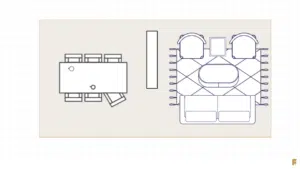
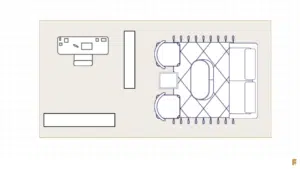
Here are some tips based on our design for Lesley and Matteo:
- Offer ample seating, including multipurpose and modular pieces, and even a few cozy floor cushions or ottomans.
- Ensure the dining table is big enough for everyone to gather around, with a mix of chairs and benches for seating.
- Aim for varied and adaptable sleeping arrangements that accommodate different types of groups with a mix of king, queen, and twin beds.
- Designate private office spaces (preferably two work stations in separate rooms) where guests can work remotely.
- Take advantage of outdoor spaces as year-round sitting areas if the climate allows. Invest in large outdoor dining and lounge furniture, pergolas and umbrellas for shade, and sturdy, weather-resistant cushions, so your guests can enjoy the fresh air.
In our experience, creating a pleasant and relaxing vacation that earns five-star reviews and repeat bookings is your best bet for upping your nightly rate—so avoid the urge to squeeze an extra guest or two into the basement office. Most often, smaller groups are willing to pay top dollar if it means a luxurious and memorable stay.
Invest now for low maintenance later
Your short-term rental is a business and, like any business, you want to lower costs and maximize profits. There are lots of ways to save money when launching your property, but there’s one place where it just doesn’t make sense to scrimp, and that’s on your core furniture pieces: your dining table and chairs, sofas, lounge chairs, and coffee tables, to name a few.
Use our cost calculator to make sense of your design budget:
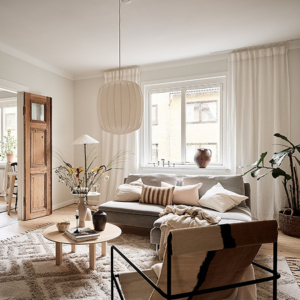
When it comes to communal furniture, your guests can feel the flimsiness of budget brands and the wear-and-tear shows quickly, making your space appear shabby and weathered.
It’s not just a bad look, it’s also a practical challenge. Sofas and dining tables are the most labour-intensive and expensive furniture to replace. Think about the time required to disassemble and remove a large piece, purchase a new one, and get it delivered and installed. Managing that becomes a logistical nightmare when you live hours from your property.
How to choose the right furniture for your short-term rental
Buying essential furnishings is an opportunity to invest in quality, durable pieces (think solid-wood and metal surfaces) from reputable brands that can withstand the daily stress of a high-traffic environment. Opt for dark, textured, or patterned fabrics like leather and performance textiles over light-colored, delicate materials to help your furniture go the distance, along with washable slipcovers and cushion covers for easy cleaning and upkeep.
Once you’ve taken care of the big-ticket items, it’s easy and fun to look for cost savings on smaller items, such as accent tables, lighting, wall art, and other decor that gives your space personality. These pieces won’t get the same overuse as bigger furniture. There are lots of options out there for lower-quality, fast-fashion pieces that look great and won’t break the bank, so let your imagination and bargain-hunting skills run wild.
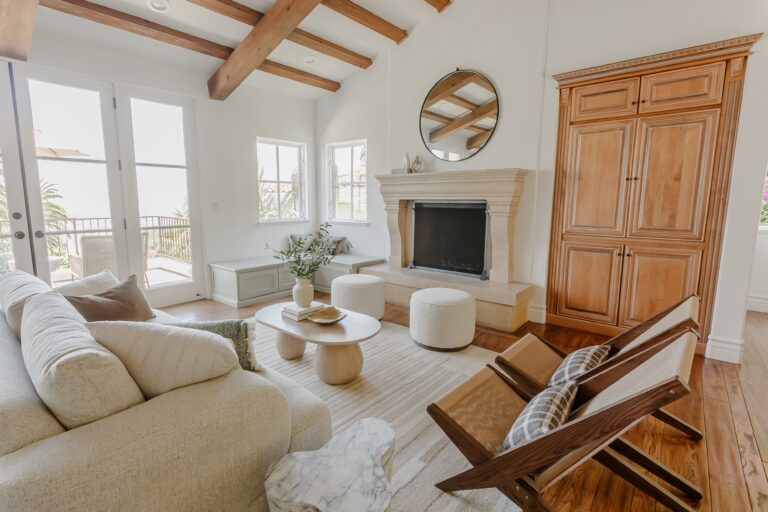
Design for space and place
Once you’ve mapped out your guest experience, it’s time to hook them with beautiful, eye-catching design. While a trained designer can make this process a whole lot easier, anyone can create a beautiful space by paying attention to two key design elements: scale and styling.
Proper scale makes your space inviting and functional
Have you ever stepped into a room and something about the design feels off? The colors, furniture style, and decor are all beautifully coordinated, but there’s a disconnect. We tend to get this feeling when the proportions of a space are wonky—when the furniture is either too big or too small for the size of the room. This can disrupt our sense of balance and harmony, making a room feel either crowded or cavernous.
When choosing furniture and rugs, consider things like the size of the room, height of the ceilings, and location of windows, doors, and architectural features. Start with the essentials and gradually add furniture until the room feels complete. This avoids overcrowding the space or disrupting traffic flow—two things you want to steer clear of when hosting larger groups.
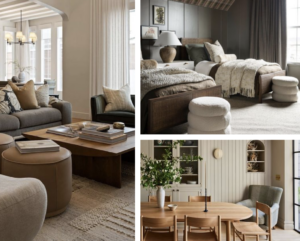
When we designed Sofia’s trendy downtown Miami studio, attention to scale and proportion were top of mind. A small space can easily feel cramped, so we opted for modern furniture, clean lines, and carefully curated decor to make the space beautiful and functional. We used the floor-to-ceiling window to frame a dedicated work station in the bedroom and area rugs to create defined spaces in the open-concept studio.
Great styling catches their eye mid-scroll
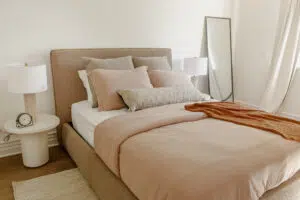
One of our favourite design strategies is to let the style of a space choose itself. Each property has its own character and personality, with unique architecture and distinct geographical features. Look at the defining elements of your space and location to inspire your styling and decor choices.
When we designed a cozy log cabin for Josh, we were guided by the unique character of his rustic, mountain retreat. From a base of neutral designs, textures, and tone-on-tone, we channeled a relaxed, comfortable vibe, adding finishes that complement the property’s backwoods setting. While Josh prefers a modern style, it made sense for our product selections and finishes to align with the cabin’s rustic vibe and satisfy his nature-seeking guest
Here are some tips for styling your space for beautiful photography, more clicks, and more bookings:

- Guests appreciate their host’s personality. Sports fans might hang tasteful wall art celebrating their favorite teams while book lovers could style a shelf with a small collection of beautiful first-edition novels. Meaningful decor lends a personal touch, giving guests a sense of who you are without overwhelming them with personal clutter.
- Guests are on an adventure. Get on board by infusing your space with local themes and character, like the tropical vibes in our client’s Miami loft. Stylized maps and old photographs make for perfect wall art. Add some local pottery, art, and coffee table books that celebrate your corner of the world.
Guests want to brag about their vacation. Fun, cozy corners encourage them to share photos of their stay. Creating an eye-catching vignette can be as simple as combining a mirror, a plant, a piece of art, and a funky bench. Use your imagination and unique pieces that inspire you to bring different corners of your home to life
Creating a wonderful vacation

Designing for short-term rental success isn’t just about having an Instagram-worthy home. It’s about using your space to create experiences your guests love. Whether they want a kitchen dance party with their childhood besties, a round of family charades by the fire, or a quiet place to recharge, a thoughtfully designed, fully-furnished space can keep the bookings rolling in.
Yours will be a place where guests create cherished vacation memories, a place that they return to again and again — and a place that they recommend to all their friends. It may take a little nudge, but at the end of a perfect vacation, they’ll be happy to write a stellar review for you, too.
Ready to kickstart your design journey?
Take our fast, fun Style Finder quiz to discover a design style that suits your space, appeals to guests, and takes the guesswork out of furnishing.

